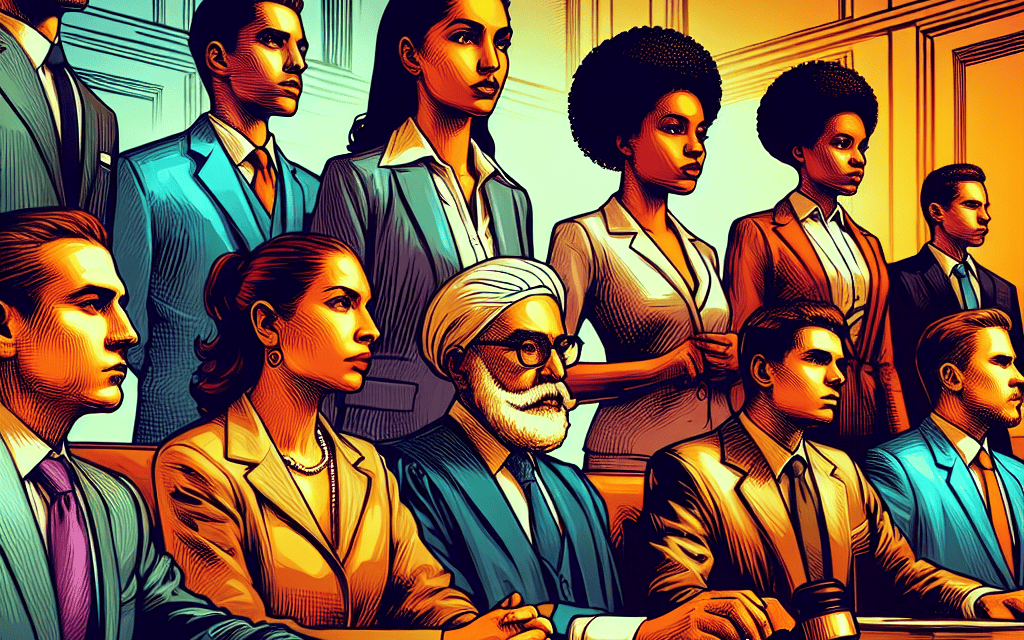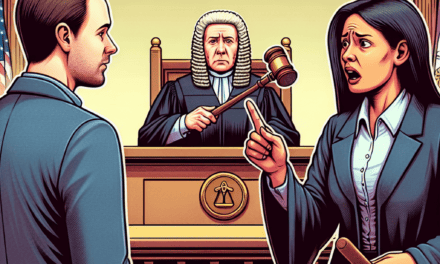“Unraveling the Crypto Conundrum: Sam Bankman-Fried’s Trial Unveiled”
Introduction
Sam Bankman-Fried’s trial has captured global attention as one of the most significant legal proceedings in the financial world. As the founder and former CEO of the cryptocurrency exchange FTX, Bankman-Fried was once hailed as a visionary in the digital currency space. However, his rapid rise to prominence has been overshadowed by allegations of financial misconduct, fraud, and regulatory violations. The trial delves into the intricate web of cryptocurrency trading, regulatory challenges, and the ethical responsibilities of financial leaders. With billions of dollars at stake and the potential to reshape the future of cryptocurrency regulation, this trial serves as a critical juncture for the industry, offering comprehensive insights into the complexities and risks associated with digital finance.
Overview Of Sam Bankman-Fried’s Legal Battle
Sam Bankman-Fried, the former CEO of the cryptocurrency exchange FTX, has found himself at the center of a legal maelstrom that has captured the attention of both the financial world and the general public. His trial, which has been unfolding with significant media coverage, marks a pivotal moment in the ongoing discourse surrounding cryptocurrency regulation and corporate governance. As the proceedings continue, they offer a comprehensive look into the complexities of legal accountability in the rapidly evolving digital asset landscape.
The charges against Bankman-Fried are extensive and multifaceted, reflecting the intricate nature of the alleged misconduct. At the heart of the legal battle are accusations of fraud and mismanagement, which prosecutors argue have led to significant financial losses for investors and stakeholders. These charges are rooted in the claim that Bankman-Fried engaged in deceptive practices to inflate the value of FTX and its associated entities, thereby misleading investors about the true state of the company’s financial health. As the trial progresses, the prosecution has been meticulously presenting evidence to substantiate these allegations, drawing on a wealth of documentation and testimony from key witnesses.
In response, Bankman-Fried’s defense team has mounted a robust counterargument, seeking to dismantle the prosecution’s case by challenging the validity of the evidence and the interpretation of his actions. They argue that the complexities of the cryptocurrency market, coupled with the nascent regulatory environment, have created a situation where traditional legal frameworks may not adequately apply. This defense strategy underscores a broader debate within the legal community about how to effectively regulate and adjudicate cases involving digital assets, which often operate outside the bounds of conventional financial systems.
As the trial unfolds, it has also brought to light the broader implications for the cryptocurrency industry as a whole. The outcome of this legal battle could set a precedent for how similar cases are handled in the future, potentially influencing regulatory approaches and corporate practices. Industry stakeholders are closely monitoring the proceedings, aware that the verdict could have far-reaching consequences for how cryptocurrency exchanges operate and are perceived by both investors and regulators.
Moreover, the trial has sparked a renewed conversation about the ethical responsibilities of corporate leaders in the digital age. Bankman-Fried, once hailed as a visionary in the cryptocurrency space, now faces scrutiny over his leadership decisions and the ethical considerations that accompany them. This aspect of the trial highlights the growing expectation for transparency and accountability in corporate governance, particularly in industries that are still defining their regulatory boundaries.
In conclusion, Sam Bankman-Fried’s trial serves as a microcosm of the challenges and opportunities inherent in the intersection of technology, finance, and law. As the legal proceedings continue to unfold, they provide a critical lens through which to examine the evolving landscape of cryptocurrency regulation and corporate responsibility. The outcome of this trial will not only determine Bankman-Fried’s personal and professional fate but also contribute to shaping the future of the cryptocurrency industry. As such, it remains a focal point for those invested in the ongoing dialogue about how to navigate the complexities of digital finance in a manner that is both innovative and ethically sound.
Key Witnesses In The Trial Of Sam Bankman-Fried
The trial of Sam Bankman-Fried, the former CEO of the cryptocurrency exchange FTX, has captured significant attention due to its implications for the broader financial and cryptocurrency sectors. As the proceedings unfold, the role of key witnesses has become a focal point, providing crucial insights into the operations and decisions that led to the collapse of FTX. These witnesses, ranging from former employees to industry experts, are instrumental in painting a comprehensive picture of the events that transpired.
To begin with, former executives from FTX have taken the stand, offering firsthand accounts of the internal dynamics and decision-making processes within the company. Their testimonies have shed light on the corporate culture and the pressures faced by employees in a rapidly evolving industry. These witnesses have detailed the strategies employed by Bankman-Fried and his team, including the aggressive expansion tactics and risk management practices that were in place. Their insights are invaluable in understanding the operational challenges that FTX encountered and the factors that contributed to its downfall.
In addition to former employees, financial analysts and industry experts have been called upon to provide their perspectives on the case. These witnesses have contextualized the actions of FTX within the broader cryptocurrency market, highlighting the volatility and regulatory uncertainties that characterize the industry. Their analyses have underscored the complexities of operating a cryptocurrency exchange and the inherent risks involved. By offering an external viewpoint, these experts have helped the court grasp the broader implications of FTX’s collapse on the financial ecosystem.
Moreover, testimonies from regulatory officials have been pivotal in examining the compliance and oversight mechanisms that were—or were not—implemented by FTX. These witnesses have provided detailed accounts of the regulatory landscape during the period in question, emphasizing the challenges faced by regulators in keeping pace with the rapid innovations in the cryptocurrency space. Their input has been crucial in assessing whether FTX adhered to existing regulations and the extent to which regulatory gaps may have contributed to the company’s failure.
Furthermore, the trial has also featured testimonies from investors and clients who were directly affected by FTX’s collapse. These witnesses have shared their experiences and the impact of the company’s downfall on their financial well-being. Their stories have added a human dimension to the trial, illustrating the real-world consequences of corporate mismanagement and the loss of trust in financial institutions. By highlighting the personal toll of FTX’s failure, these testimonies have reinforced the need for accountability and transparency in the financial sector.
As the trial progresses, the testimonies of these key witnesses continue to play a critical role in unraveling the complexities of the case. Their diverse perspectives and experiences provide a multifaceted understanding of the factors that led to the collapse of FTX and the broader implications for the cryptocurrency industry. Through their accounts, the court is better equipped to assess the actions of Sam Bankman-Fried and determine the appropriate course of justice. Ultimately, the insights gained from these witnesses will not only influence the outcome of the trial but also shape the future of regulatory practices and corporate governance in the rapidly evolving world of cryptocurrency.
Legal Strategies: Defense And Prosecution In The Sam Bankman-Fried Case
In the high-profile trial of Sam Bankman-Fried, the legal strategies employed by both the defense and the prosecution have been meticulously crafted, reflecting the complexity and significance of the case. As the founder of the now-defunct cryptocurrency exchange FTX, Bankman-Fried faces a myriad of charges, including fraud and conspiracy, which have drawn intense public and media scrutiny. The prosecution’s strategy is centered on presenting a robust narrative that underscores the alleged financial misconduct and deceptive practices orchestrated by Bankman-Fried. By leveraging a wealth of documentary evidence, including financial records and internal communications, the prosecution aims to paint a comprehensive picture of the alleged fraudulent activities. Furthermore, they have enlisted expert witnesses to elucidate the technical aspects of cryptocurrency transactions and blockchain technology, thereby ensuring that the jury fully comprehends the intricacies of the case. This approach is designed to establish a clear link between Bankman-Fried’s actions and the financial losses suffered by investors, thereby reinforcing the gravity of the charges.
Conversely, the defense has adopted a strategy that seeks to dismantle the prosecution’s narrative by challenging the validity and interpretation of the evidence presented. Central to their approach is the argument that Bankman-Fried’s actions were not driven by malicious intent but rather by a genuine belief in the potential of cryptocurrency to revolutionize the financial industry. The defense contends that the collapse of FTX was not a result of deliberate fraud but rather a consequence of unforeseen market forces and regulatory challenges. To bolster this argument, the defense has called upon industry experts to testify about the volatile nature of the cryptocurrency market and the inherent risks associated with it. Additionally, they have sought to highlight Bankman-Fried’s previous philanthropic efforts and his commitment to effective altruism, aiming to portray him as a well-intentioned entrepreneur rather than a criminal mastermind.
As the trial progresses, both sides have engaged in rigorous cross-examinations, seeking to expose inconsistencies and weaknesses in each other’s arguments. The prosecution has focused on questioning the credibility of the defense’s expert witnesses, attempting to undermine their testimonies by highlighting potential biases or conflicts of interest. Meanwhile, the defense has scrutinized the methods used by the prosecution to gather and analyze evidence, raising concerns about the possibility of misinterpretation or manipulation. This adversarial dynamic has resulted in a courtroom atmosphere that is both tense and highly charged, with each side striving to gain the upper hand.
In addition to the legal arguments, the trial has also been marked by strategic decisions regarding jury selection and public relations. The prosecution has aimed to select jurors who are likely to be sympathetic to the plight of defrauded investors, while the defense has sought individuals who may be more open to the complexities and uncertainties of the cryptocurrency industry. Outside the courtroom, both sides have engaged in media campaigns to shape public perception, recognizing the potential impact of public opinion on the trial’s outcome.
Ultimately, the trial of Sam Bankman-Fried represents a landmark moment in the intersection of law and cryptocurrency, with the legal strategies employed by both the defense and the prosecution reflecting the broader implications of the case. As the proceedings continue, the outcome remains uncertain, with each side steadfastly committed to advancing their respective narratives. The trial’s resolution will not only determine Bankman-Fried’s fate but also set a precedent for how similar cases may be approached in the future, underscoring the evolving nature of legal strategies in the digital age.
Financial Implications Of The Sam Bankman-Fried Trial

The trial of Sam Bankman-Fried, the former CEO of the now-defunct cryptocurrency exchange FTX, has captured the attention of financial markets and legal experts alike. As proceedings unfold, the financial implications of this high-profile case are becoming increasingly apparent, with potential repercussions for the broader cryptocurrency industry and investor confidence. To understand the full scope of these implications, it is essential to consider the various facets of the trial and their interconnected effects on the financial landscape.
First and foremost, the trial has brought to light significant concerns regarding regulatory oversight in the cryptocurrency sector. The allegations against Bankman-Fried, which include fraud and mismanagement of customer funds, have underscored the urgent need for more stringent regulatory frameworks. This has prompted financial regulators worldwide to reevaluate their approach to cryptocurrency exchanges and digital assets. Consequently, the trial could lead to the implementation of stricter regulations, which may impact the operational costs and compliance requirements for cryptocurrency businesses. While such measures could enhance investor protection and market stability, they might also stifle innovation and limit the growth potential of the industry.
Moreover, the trial has had a pronounced effect on investor sentiment. The collapse of FTX, once a leading player in the cryptocurrency market, has shaken the confidence of both retail and institutional investors. As details of the alleged financial misconduct emerge, investors are becoming increasingly wary of the risks associated with digital assets. This heightened caution could result in reduced capital inflows into the cryptocurrency market, potentially leading to lower valuations and increased volatility. In turn, this may affect the ability of cryptocurrency companies to raise funds and expand their operations, thereby influencing the overall trajectory of the industry.
In addition to regulatory and investor-related implications, the trial has also highlighted the importance of corporate governance and transparency within the cryptocurrency sector. The allegations against Bankman-Fried have raised questions about the internal controls and risk management practices of cryptocurrency exchanges. As a result, there is likely to be a renewed focus on enhancing corporate governance standards to prevent similar incidents in the future. This could involve the adoption of best practices from traditional financial institutions, such as independent audits and robust internal controls, which may increase operational costs but ultimately strengthen the credibility and resilience of the industry.
Furthermore, the trial has sparked a broader conversation about the role of cryptocurrencies in the global financial system. As the case unfolds, it serves as a reminder of the potential risks and rewards associated with digital assets. While cryptocurrencies offer innovative solutions and opportunities for financial inclusion, they also pose unique challenges that require careful consideration and management. The outcome of the trial could influence policymakers’ perceptions of cryptocurrencies and shape the future regulatory landscape, potentially affecting the integration of digital assets into mainstream financial systems.
In conclusion, the trial of Sam Bankman-Fried carries significant financial implications that extend beyond the immediate legal proceedings. By highlighting the need for enhanced regulatory oversight, investor protection, corporate governance, and a balanced approach to cryptocurrency integration, the case serves as a pivotal moment for the industry. As stakeholders navigate these complex issues, the trial’s outcome will likely have a lasting impact on the evolution of the cryptocurrency market and its role in the global financial ecosystem.
Public Reactions To Sam Bankman-Fried’s Court Proceedings
The trial of Sam Bankman-Fried, the former CEO of the now-defunct cryptocurrency exchange FTX, has captured the public’s attention, sparking a wide array of reactions across various platforms. As the proceedings unfold, the public’s response has been as multifaceted as the case itself, reflecting a spectrum of opinions and emotions. This trial, which delves into allegations of financial misconduct and fraud, has not only drawn the interest of those within the financial and cryptocurrency sectors but has also resonated with the general public, who are keenly observing the implications of such high-profile legal battles.
Initially, the public’s reaction was one of shock and disbelief. Bankman-Fried, once hailed as a visionary in the cryptocurrency world, was seen by many as a pioneer who could bridge the gap between traditional finance and digital currencies. His arrest and subsequent trial have shattered this image, leading to a sense of betrayal among his supporters. Many individuals who had invested in FTX or followed Bankman-Fried’s career closely expressed feelings of disillusionment, as they grappled with the possibility that someone they admired could be involved in such serious allegations.
As the trial progressed, public sentiment began to diversify. On one hand, there are those who view the proceedings as a necessary step towards accountability in the rapidly evolving world of cryptocurrency. These individuals argue that the trial serves as a crucial reminder of the importance of regulatory oversight and ethical conduct in financial markets. They believe that holding influential figures like Bankman-Fried accountable is essential to maintaining trust and integrity within the industry. This perspective is often echoed by financial analysts and experts who emphasize the need for clear regulations to prevent similar incidents in the future.
Conversely, there is a segment of the public that remains skeptical of the trial’s motives and outcomes. Some individuals perceive the legal actions against Bankman-Fried as part of a broader crackdown on the cryptocurrency industry, which they argue is driven by traditional financial institutions seeking to stifle innovation. This viewpoint is particularly prevalent among cryptocurrency enthusiasts who fear that the trial could set a precedent for increased regulation that might hinder the growth and development of digital currencies. They argue that while accountability is important, it should not come at the expense of stifling technological advancement.
Moreover, the trial has sparked discussions about the broader implications for the cryptocurrency market. Investors and market participants are closely monitoring the proceedings, as the outcome could have significant ramifications for the industry. A conviction could lead to increased scrutiny and regulatory measures, potentially affecting market dynamics and investor confidence. On the other hand, an acquittal might embolden those who advocate for a more laissez-faire approach to cryptocurrency regulation.
In addition to these varied reactions, the trial has also highlighted the role of media coverage in shaping public perception. The extensive media attention has ensured that the trial remains in the public eye, with news outlets providing regular updates and analyses. This coverage has played a crucial role in informing the public and shaping their opinions, as individuals rely on media reports to understand the complexities of the case.
In conclusion, the public reactions to Sam Bankman-Fried’s trial are as complex and nuanced as the case itself. As the proceedings continue, they serve as a reflection of the broader debates surrounding accountability, regulation, and innovation within the cryptocurrency industry. Whether viewed as a necessary pursuit of justice or a potential hindrance to progress, the trial undeniably underscores the evolving relationship between law, finance, and technology.
The Role Of Cryptocurrency In Sam Bankman-Fried’s Legal Issues
Sam Bankman-Fried, the once-celebrated figure in the cryptocurrency world, now finds himself at the center of a legal storm that has captivated global attention. The role of cryptocurrency in his legal issues is both pivotal and complex, serving as a backdrop to the charges he faces. To understand the intricacies of this case, it is essential to delve into how cryptocurrency, with its decentralized and often opaque nature, has played a significant role in the unfolding legal drama.
Cryptocurrency, by its very design, offers a level of anonymity and freedom from traditional financial systems. This characteristic, while appealing to many, also presents unique challenges in the realm of legal accountability. In the case of Sam Bankman-Fried, these challenges are magnified. As the founder of FTX, a major cryptocurrency exchange, Bankman-Fried was at the forefront of a rapidly evolving industry that often outpaces regulatory frameworks. The charges against him, which include allegations of fraud and mismanagement, are deeply intertwined with the very nature of cryptocurrency operations.
One of the primary issues at the heart of Bankman-Fried’s legal troubles is the alleged misuse of customer funds. In traditional financial systems, there are stringent regulations and oversight mechanisms designed to protect investors and ensure transparency. However, the cryptocurrency landscape is still in its nascent stages of regulation, creating a fertile ground for potential misconduct. Prosecutors argue that Bankman-Fried exploited these regulatory gaps, using customer deposits for unauthorized purposes. This alleged misuse not only highlights the vulnerabilities within the cryptocurrency ecosystem but also underscores the urgent need for more robust regulatory measures.
Moreover, the decentralized nature of cryptocurrency complicates the tracing of transactions, making it difficult for investigators to follow the money trail. This opacity is a double-edged sword; while it protects user privacy, it also poses significant hurdles for law enforcement agencies attempting to build a case. In Bankman-Fried’s trial, the prosecution’s ability to unravel complex blockchain transactions will be crucial in establishing a clear narrative of financial wrongdoing. This aspect of the trial serves as a litmus test for the legal system’s capacity to adapt to the challenges posed by digital currencies.
Furthermore, the global reach of cryptocurrency adds another layer of complexity to Bankman-Fried’s legal issues. Unlike traditional financial crimes that are often confined within national borders, cryptocurrency transactions can easily cross jurisdictions, complicating legal proceedings. This international dimension necessitates cooperation between regulatory bodies across different countries, a task that is often fraught with bureaucratic and legal hurdles. The outcome of Bankman-Fried’s trial could set important precedents for how such cross-border cryptocurrency cases are handled in the future.
In conclusion, the role of cryptocurrency in Sam Bankman-Fried’s legal issues is multifaceted, reflecting both the innovative potential and the inherent risks of digital currencies. As the trial unfolds, it will not only determine the fate of one of the industry’s most prominent figures but also shape the future landscape of cryptocurrency regulation and enforcement. The case serves as a stark reminder of the delicate balance between fostering innovation and ensuring accountability in the rapidly evolving world of digital finance. As such, it is being closely watched by industry stakeholders, regulators, and legal experts alike, all of whom are keenly aware of its broader implications.
Potential Outcomes And Consequences Of Sam Bankman-Fried’s Trial
The trial of Sam Bankman-Fried, the former CEO of the now-defunct cryptocurrency exchange FTX, has captured the attention of both the financial world and the general public. As the proceedings unfold, the potential outcomes and consequences of this high-profile case are being closely scrutinized. The trial’s verdict could have far-reaching implications, not only for Bankman-Fried himself but also for the broader cryptocurrency industry and regulatory landscape.
To begin with, the most immediate outcome of the trial will be the determination of Bankman-Fried’s guilt or innocence regarding the charges brought against him. These charges, which include allegations of fraud, mismanagement, and violation of financial regulations, could result in severe penalties if he is found guilty. A conviction could lead to significant fines, restitution payments, and potentially a lengthy prison sentence. Such a verdict would serve as a cautionary tale for other executives in the cryptocurrency sector, emphasizing the importance of adhering to legal and ethical standards.
Conversely, if Bankman-Fried is acquitted, it could embolden other players in the cryptocurrency market, potentially leading to a more aggressive pursuit of innovative, albeit risky, financial strategies. An acquittal might also raise questions about the adequacy of existing regulations and the ability of legal frameworks to effectively address the complexities of digital currencies. This could prompt lawmakers and regulators to reevaluate and possibly strengthen the regulatory environment surrounding cryptocurrencies to prevent similar cases in the future.
Beyond the immediate legal ramifications for Bankman-Fried, the trial’s outcome could significantly influence investor confidence in the cryptocurrency market. A guilty verdict might trigger a wave of skepticism among investors, leading to increased volatility and a potential decline in cryptocurrency valuations. This could, in turn, affect the broader financial markets, given the growing interconnectivity between traditional finance and digital assets. On the other hand, an acquittal might restore some degree of confidence, although it would likely not eliminate the underlying concerns about the risks associated with cryptocurrency investments.
Furthermore, the trial has the potential to shape public perception of the cryptocurrency industry as a whole. A conviction could reinforce negative stereotypes about the sector, portraying it as a haven for fraudsters and unscrupulous actors. This could hinder mainstream adoption and slow down the integration of cryptocurrencies into everyday financial transactions. In contrast, an acquittal might help to mitigate some of these negative perceptions, although it would not necessarily address the broader issues of trust and transparency that continue to challenge the industry.
In addition to these potential outcomes, the trial may also have long-term consequences for regulatory policy. Regardless of the verdict, the case has already highlighted the need for clearer guidelines and more robust oversight of the cryptocurrency market. Policymakers may use the trial as a catalyst to push for comprehensive regulatory reforms aimed at enhancing consumer protection, ensuring market stability, and fostering innovation within a secure framework. Such reforms could include stricter licensing requirements for cryptocurrency exchanges, enhanced anti-money laundering measures, and improved mechanisms for monitoring and reporting suspicious activities.
In conclusion, the trial of Sam Bankman-Fried is a pivotal moment for the cryptocurrency industry, with potential outcomes and consequences that extend far beyond the courtroom. Whether the verdict results in a conviction or an acquittal, the case is likely to influence investor confidence, public perception, and regulatory policy in significant ways. As the trial progresses, stakeholders across the financial landscape will be watching closely, aware that its implications could shape the future of digital currencies for years to come.
Q&A
1. **What are the charges against Sam Bankman-Fried?**
Sam Bankman-Fried faces charges including wire fraud, securities fraud, and money laundering related to the collapse of his cryptocurrency exchange, FTX.
2. **When did the trial begin?**
The trial began in October 2023.
3. **What is the significance of this trial?**
The trial is significant as it addresses major allegations of financial misconduct in the cryptocurrency industry, potentially setting precedents for future regulatory actions.
4. **Who are the key witnesses in the trial?**
Key witnesses include former FTX executives, financial experts, and possibly investors who were affected by the exchange’s collapse.
5. **What is Sam Bankman-Fried’s defense strategy?**
His defense strategy reportedly focuses on challenging the intent behind the alleged fraudulent activities and questioning the reliability of witness testimonies.
6. **What potential penalties does he face if convicted?**
If convicted, Sam Bankman-Fried could face substantial fines and a lengthy prison sentence, potentially up to several decades.
7. **How has the trial impacted the cryptocurrency market?**
The trial has increased scrutiny on cryptocurrency exchanges and may lead to tighter regulations, affecting market stability and investor confidence.
Conclusion
Sam Bankman-Fried’s trial has been a landmark case in the financial and cryptocurrency sectors, drawing significant attention due to the high-profile nature of the defendant and the complex legal issues involved. The trial has highlighted critical concerns about regulatory oversight, ethical standards, and the responsibilities of financial leaders in the rapidly evolving digital currency landscape. As proceedings unfolded, the evidence presented and testimonies given provided a deeper understanding of the operational intricacies and potential malpractices within cryptocurrency exchanges. The outcome of the trial is likely to have far-reaching implications, potentially influencing future regulatory frameworks and setting precedents for accountability in the industry. Ultimately, the trial underscores the necessity for transparency, robust governance, and ethical conduct in financial innovations to maintain public trust and ensure market stability.





